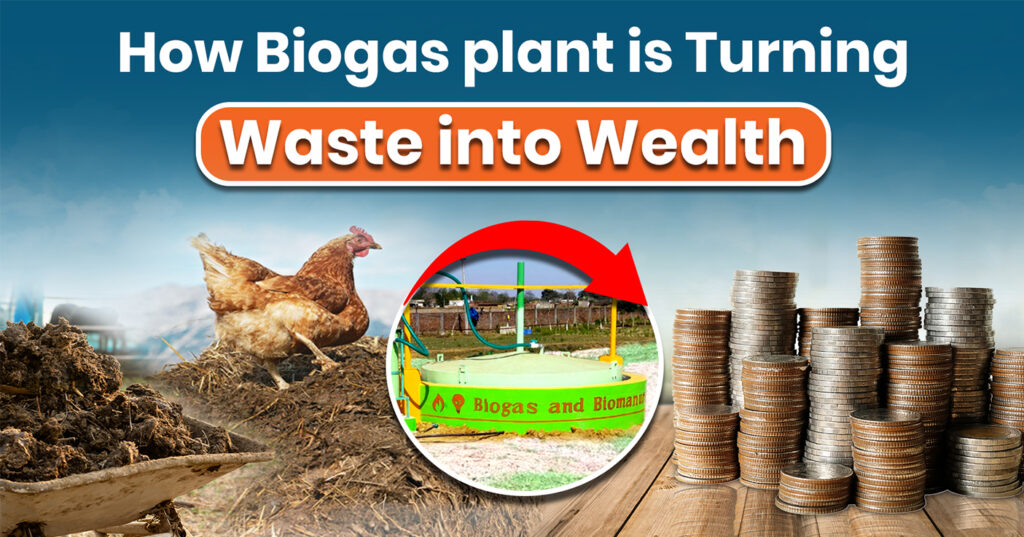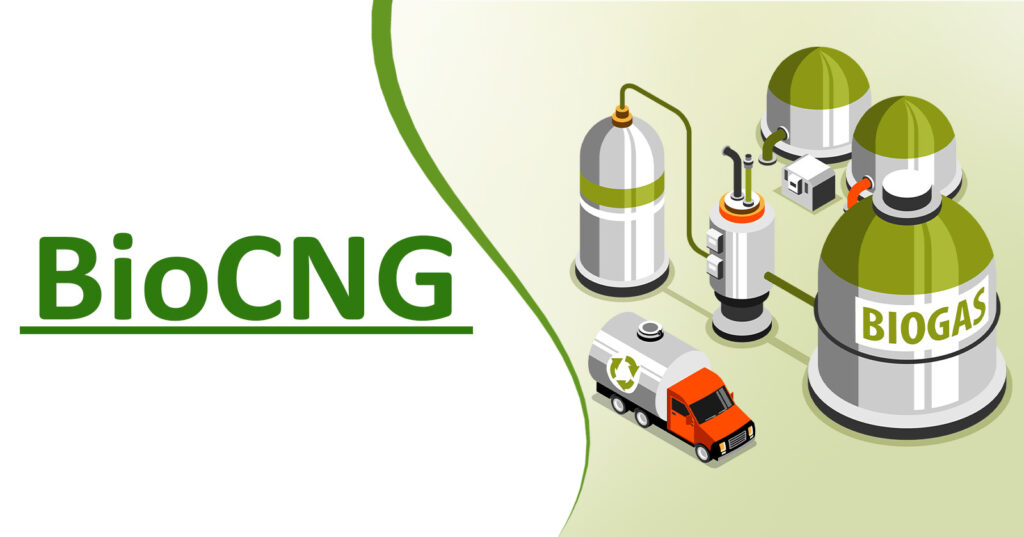Biogas or as we call it in India, ‘GOBAR Gas’ is a biofuel that is obtained from the decomposition of organic material. In today’s world, we’re all looking for less harmful ways to generate energy. Biogas comes forward as the best alternative to traditional carbon-emitting non-renewable fuels and energy sources.
Unlike non-renewable energy sources like petroleum, Natural Gas, Firewood, and Coal which will eventually biogas production depends on organic waste or biomass it is one of the sources that will always be there even when these natural resources run out.
Biogas is a renewable and environmentally friendly source of energy that not only is clean but can be a great solution to save our depleting environment.
It is obtained by the natural breakdown of organic matter. Biogas energy is a clean and renewable source produced from organic waste like crop residues, animal manure, and food waste.
Biogas is a mixture of gases, where the main components are methane (CH4) and carbon dioxide (CO2), where methane contributing 50-70% of the gas composition, depending on the type of waste used. Methane, being an excellent source of energy, can be used to fuel vehicles, produce heat, and generate electricity.
How Is Biogas Formed?
Biogas is formed in a Biogas Plant or a GOBAR Gas Plant. What is a Biogas Plant? Imagine a special place where bacteria work their magic in the absence of oxygen. This magical place is called a digester, and in this digester, a process called Anaerobic digestion takes place.
It is a biological process where organic materials, such as agricultural waste, animal manure, food waste, and sewage, are broken down in the absence of oxygen. This breakdown process is carried out by microorganisms, which decompose the organic matter and produce biogas as a byproduct.
Uses of Biogas
Biogas or Gobar gas does not just serve as a method for efficient management of organic waste but also has multiple applications and benefits. Some of these are:
1. Waste Treatment and Odour Control:
Biogas plants play a role in waste management by treating organic waste and reducing the volume of material that would otherwise end up in landfills. Additionally, the anaerobic digestion process helps control and minimize odours associated with organic waste.
2. Cooking and heating gas:
In most parts of the world, especially in China and India, Domestic biogas plants are installed to obtain biogas for cooking and heating purposes. Biogas is a clean-burning fuel, which means that while burning, it produces comparatively fewer greenhouse gases. Using biogas energy helps reduce dependence on fossil fuels and cuts down greenhouse gas emissions.
3. Electricity Generation:
Biogas can be utilized in gas engines or turbines to generate electricity. Biogas-powered generators can provide electricity for homes in both urban and rural areas, or they can even power industries or it can be utilized for manufacturing processes, machinery operation, and other industrial activities. Biogas energy supports rural development by providing affordable cooking fuel and electricity in villages.
4. Biomethane for Transportation:
Biogas can be further purified to biomethane or Bio-CNG through a purification process, making it suitable for use as a vehicle fuel. Bio-CNG is a replacement for compressed natural gas (CNG), which can be used to reduce greenhouse gas emissions from the transportation sector.
Advantages of Biogas
1. Renewable and Sustainable:
Unlike fossil fuels, which are finite and, if exhausted, will take millions of years to regenerate, Biogas production depends on the organic waste.
As long as there is organic waste or biomass, there will be a potential source of biogas. This contrasts with finite and depleting fossil fuels like petroleum and coal.
2. Reduced Greenhouse Gas Emissions:
Unlike the combustion of fossil fuels, burning biogas produces lower levels of greenhouse gases. Additionally, the anaerobic digestion process in biogas production prevents the release of methane, a potent greenhouse gas, into the atmosphere, contributing to climate change mitigation.
3. Waste Management:
Biogas production addresses the issue of organic waste management. By utilizing agricultural residues, food scraps, and animal manure, biogas not only produces energy but also helps reduce the release of methane emissions originating from decomposing organic matter.
4. Localized Energy Freedom:
Biogas is special because it can be made right where you live. This means communities and businesses can make their energy using stuff that’s easy to find nearby, like organic materials.
This not only helps them become more self-reliant when it comes to energy, but it also makes them better prepared for times when energy from other sources might not be available.
5. Bio-Manure production:
Biogas plants not only produce gases, they also produce a semi-solid slurry which is called ‘Digestate’. For agricultural communities, this nutrient-rich Digestate can work as a miracle to grow their crops since it is much better than chemical fertilizers.
Wrapping Up
In a world increasingly focused on sustainability, biogas comes up as a versatile and eco-conscious energy solution. It’s formed naturally from organic waste, boasts a wide range of practical applications, and offers numerous environmental benefits.
By opting for biogas, we can reduce our reliance on traditional fuels, manage waste effectively, and take a step towards a cleaner, greener future.
So, let’s embrace the power of biogas and take a significant step toward a more sustainable future. Together, we can make a difference!
Frequently Asked Questions (FAQs)
Question: Is biogas environmentally friendly?
Answer: Yes, biogas is good for the environment because it is made from organic waste and can be used as clean energy. It helps reduce pollution, lowers greenhouse gases, and uses waste in a smart way. But its impact can change based on the type of waste used and how the biogas is used.
Question: What is the main use of biogas?
Answer: Biogas can generate electricity and heat by burning it. If purified to remove extra gases, it turns into biomethane, which can power cars or be fed into the gas supply network.
Question: What are the benefits of biogas?
Answer: Biogas is a clean and renewable source of energy produced through biodigestion. It is environmentally friendly because it does not pollute and helps reduce greenhouse gas emissions, thereby lowering the greenhouse effect.
Question: What are the types of biogas?
Answer: Biogas can be made in different types of plants, based on how they are built and how they work.
However, there are some major types of biogas plants, such as fixed dome, floating dome, and batch or continuous flow systems. They can also be grouped by the type of waste they use, such as wet or dry materials.
Question: What is Gobar Gas?
Answer: Gobar gas, also called biogas, is a renewable energy source made from cow dung and other organic waste. It is clean, low-cost, and mainly used in villages for cooking, heating, and lighting.
The gas is produced in a biogas plant, where the waste breaks down and releases methane, which is used as fuel.








